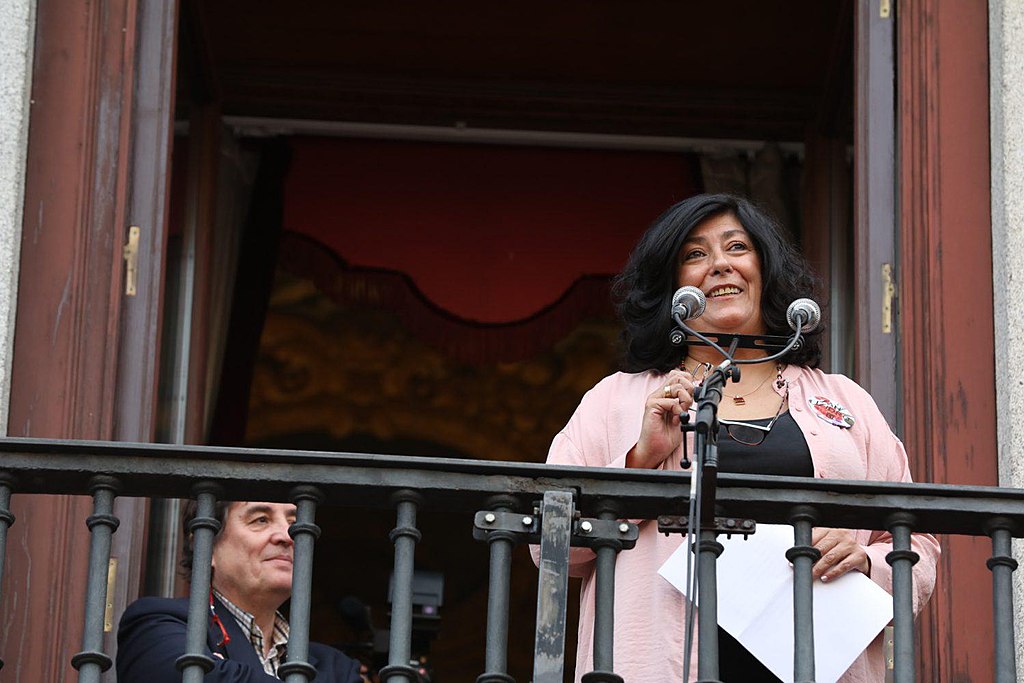The writer Almudena Grandes, died on Saturday at the age of 61 from cancer, the Spanish Film Academy announced. Grandes also wrote a column in ‘El País’ in which she announced she was suffering from cancer, discovered during a routine check-up.
Grandes, born in Madrid in 1960, became known in 1989 for ‘Las edades de Lulú’ (Episodes from the life of Lulu) a work that earned her the Premio Sonrisa Vertical. Bigas Luna, one of the most important and influential film directors of Spanish cinema, adapted it for film.
Her novels ‘Te llamaré viernes’ (Friday I will call you), ‘Malena es un nombre de tango’ (Malena), ‘Atlas de geografía humana’ (Atlas of Human Geography), ‘Los aires difíciles’ (The Spirit of the Wind), ‘Castillos de Cartón'(Castles in the Air), El corazón helado’ (Icy Heart) and ‘Los besos en el pan’ (Little Heroes), together with the collections of short stories ‘Modelos de mujer’ (Exemplary Women) and ‘Estaciones de paso’ (Intermediate Stations), have made her one of the most established and internationally renowned names in contemporary Spanish literature. Almudena Grandes was an honorary patron of the Fundación Academia de Cine.
Grandes top works
In 2010, she published ‘Inés y la alegría’ (Agnes and Joy), the first title in the series Episodios de una Guerra Interminable (Episodes of an Endless War). It won the Premio de la Crítica de Madrid, the Premio Iberoamericano de Novela Elena Poniatowska and the Premio Sor Juana Inés de la Cruz).
‘El lector de Julio Verne’ (My father’s enemy) followed in 2012; and ‘Las tres bodas de Manolita’ (The three weddings of Manolita) in 2014. In 2017, ‘Los pacientes del doctor García’ (The patients of doctor García) won the Premio Nacional de Narrativa. In 2020 she wrote ‘La madre de Frankenstein’ (The mother of Frankenstein).
Strong links with film
According to the Film Academy, Grandes had strong ties to film. She began her career writing texts for encyclopaedias. She flirted with acting and her most notable role was in the film ‘A contratiempo’, alongside Óscar Ladoire. Many of her works appeared on the big screen.
Following the adaptation of ‘Las edades de Lulú’, was ‘Malena es un nombre de tango’ and ‘Los aires difíciles’, both by Gerardo Herrero; ‘Castillos de cartón’, by Salvador Gracia Ruiz; ‘Aunque tú no lo sepas’, by Juan Vicente Córdoba and ‘Atlas de geografía humana’, by Azucena Rodríguez.
Involved and committed
In an interview with the Spanish newspaper Europa Press in February 2020, following the publication of a new episode of her pieces on the civil war in ‘La madre de Frankenstein’, Almudena Grandes said that ‘Spain’s biggest problem’ arises when ‘the right wing loses power and behaves as if it has been stolen’.
‘It is a problem because they feel that Spain is theirs, because they inherited it and they are the ones who have the right to govern. If we don’t solve this soon, we will endanger the future of this country,’ she said.
In fact, Grandes believed Spain was going through an ‘untenable situation of anger and tension’ that went back many years, to the beginning of Spain’s democratic transition. ‘All this is a consequence of the way democracy was founded, without completely severing ties with Franco’s dictatorship and without caring about the victims of Franco’s regime,’ she argued.
No Spanish unity
‘Moreover, this problem is compounded by other problems that together constitute a “systemic crisis” in Spain. ‘There are many millions of Spaniards who will never be anything other than Spaniards all their lives and who do not identify with this country. They see a flag and it is not theirs, unless it is for a world championship, which is the only time we are a normal country,’ Grandes said.
Grandes has also written books on the fraught theme of the Spanish Civil War and the Franco period thereafter. In The Mother of Frankenstein, Grandes travelled to post-war Spain in the 1950s, where the National Catholicism of the Staten ‘exercised terror in a different way’. She continued: ‘There were no more executions or parades or raids, but the State and the Church penetrated into the intimacy of the people. It was a breathless atmosphere in a country that had known for some time that Franco was there’. Grandes set the story, starring the young psychiatrist Germán Velázquez, in the Ciempozuelos women’s institution in Madrid.
Great writer, great loss
From an early age, Almudena Grandes knew she wanted to be a writer. Her work has been translated into many languages. Nobel Prize winner Mario Vargas Llosa characterised Almudena Grandes ‘as one of the greatest writers of our time’.
In addition to being a writer and columnist, Grandes was also a regular guest on the radio programme ‘Hoy por hoy’ of the Spanish station Cadena SER.


